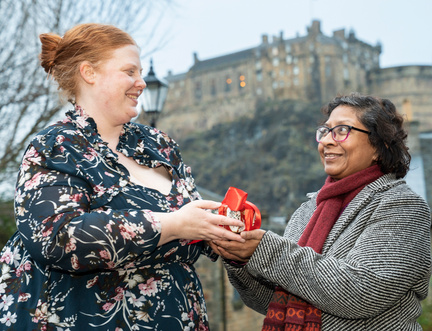On the shoulders of others
By Theresa Breslin
We have commissioned a new piece of writing from fifty leading authors on the theme of 'Elsewhere' - read on for Theresa Breslin's contribution.
When the tour buses halted at the cotton fields beyond Samarkand it was Ramil who was always first to break off working.
Like exotic migrant birds, tourists from Britain, America, Germany, Japan and elsewhere would swoop, flocking and chaffering, along the roadside. Often Ramil took the chance to light a cigarette and observe from a distance. No one was interested in him anyway. It was the women they wanted to see: those who still wore the traditional vibrant Uzbek dress, the dark-eyed young girls, and the older folk with their array of gold-filled front teeth.
Most of the tourists would have read up on the history and culture of Uzbekistan and absorbed the information provided by the more diligent tour guides. These foreign visitors didn’t consider themselves tourists – in their view tourists went off to holiday resorts for a fortnight in the sun. They were “travellers” he’d heard them say, and they especially wanted to visit the land of the Great Silk Road to follow in the footsteps of famous explorers, such as Marco Polo, who’d made this journey before them.
Ramil, wearing his designer logo T-shirt and jeans, wasn’t worth a photograph to show back home. As usual, this group ignored him. He didn’t care. It gave him the opportunity to approach the tractor drivers. Ramil finished his cigarette, picked up his almost empty cotton-collecting sack and, walking past the old man who swept up the leavings of the workers, he went to the end of the row where one of drivers stood beside the weighing machine. The western cigarettes Ramil’s affluent father bought for him were visible inside the sack as he handed it over. Moments later he returned to the field with his sack empty of cigarettes but bulging with cotton – a respectable amount, so that he wouldn’t lose face when it came to weighing-in time.
In this country it was all about losing face or rather not losing face. But it was ridiculous that he should be here picking cotton like a field hand for a miserable wage. His family claimed they could trace ancestry to the mighty Timur, the warrior known as Tamerlane, who’d crushed the Golden Horde and tried to forge a nation from diverse tribes. And his parents were wealthy. They didn’t need to hap up their belongings and sit at crossroads with their children, waiting for the harvest hirers to look them over before deciding whether to employ them. Yet his father insisted that now Ramil was at university his son must take part in the harvest, as lots of students did, and live for six weeks in basic shared accommodation to help pick cotton.
‘Cotton is vital for our economy,’ his father said. ‘It provides clothes and paper and soap and cattle feed and a host of other uses. The world needs cotton. It’s Uzbekistan’s “white gold” and the work of those who went before you is why you’re able to attend university. Young people have always helped with the harvest. It’s part of your heritage, an obligation. You must go.’
With a roar of its engine and trailing a plume of exhaust fumes the bus left and the workers drifted back. Ramil inclined his head to the attractive girl he’d noticed earlier. A university student like himself, yet she was completely at ease in this environment. He gave her a small salute and she smiled and waved. Ah… his mood lifted. Although, he thought her as naïve as the rest, who never accepted money for photographs, and were just happy to see their faces on the digital cameras or to take a break to practise their English. He watched her join the women chatting about the tourists and the countries they came from.
By evening Ramil was exhausted. His city living hadn’t prepared him for the sheer hard work. The prickly spines of the bolls that held the cotton fibre tore at his fingers and sweat stains were spoiling his expensive T-shirt. The rest of the workers didn’t seem to mind so much. Together on the seating mattresses beside the low tables spread with coloured cloth and laden with plates of pilaff and baskets full of round golden bread they began to tell stories.
He managed to manoeuvre himself next to the girl while the tales of Hodja Nasreddin, part sage, part trickster, were exchanged. It didn’t matter that everyone knew these riddles and jokes from childhood. Their re-telling was like a family gathering where a familiar anecdote is anticipated with glee and laughter. Someone who’d lived in the Americas commented that similar stories existed there. After each telling people would unravel the story and discuss possible meanings and new interpretations.
Darkness came and the lamps were lit. A woman looked up at the stars blazing in the cold bright sky and spoke of the past, and of the famous scientist Ulugbek, grandson of the fierce conqueror Emperor Timur. Ulugbek didn’t wish to be a warrior and became instead an astronomer. He built an observatory and accurately calculated the days of the year. He had knowledge of the planets at a time when Europe believed that a sailing ship might fall off the western end of the Atlantic Ocean.
Ramil had a sudden memory of his father taking him outside on a night much like this and naming the constellations. He’d been quite young and complained that he could not properly see, so his father had hoisted him up onto his shoulders.
Tea was poured into little bowls and distributed around the tables and then an old man spoke up, saying: ‘I know a tale, but it would chill the bones of those who hear it.’
They begged him to continue. The old man drank some tea before he began,
‘My story is of two men, a father and son, who ran a large roadside inn, a caravanserai, in the Kyzyl Kum desert. Their caravanserai was an important stopping place as there was no other water source available for enormous distances on every side. Caravans of rich merchants laden with silks and spices, carpets, jewels, perfume and furs passed that way. They stopped at this caravanserai where the father and his son fed and watered the travellers, camels and horses, and provided overnight accommodation for all.
‘It was not unusual for traders to go missing along the Great Silk Road, and in that area they frequently did. But since time began humans have always vanished in the desert. They are prey for brigands and robbers, and also, who knows what spirits lie out there to trap the unwary? Djinns move through the desert, raising sandstorms in seconds and covering tracks. Thus travellers lose their way.’
Several of the listeners vouched that this was true. Had they not witnessed with their own eyes trailing streams of light and felt a wind arising on a calm day to stir the sand?
‘Sometimes whole caravans disappeared, swallowed up by the desert. And all that could be done was to hope that they died in grace,’ the old man cupped his hands to his face, ‘and commend their souls to God.’
In agreement, those at the table followed suit.
‘One day,’ the old man went on, ‘there was a fault with the water supply. The well, which was a short distance from the main building of the caravanserai, began to give off a bad smell. The water in the adjoining bathhouse ran murky and foul.
'The locals sent word to the government and, as any disruption to such important trade would affected their income, the government immediately dispatched officials and soldiers to investigate. Beside the well the soldiers dug down to try to locate the water table and the source of the spring. Far beneath the desert sands they broke through a layer of rock and into a vast underground cavern.
‘Inside the cavern they found,’ the old man paused to take a sip of his tea and wipe his mouth with his scarf. ‘Inside this underground cave,’ he continued, ‘was a…. bear. A huge, blind, bear, and….,’ the old man looked around at his audience, ‘strewn everywhere were hundreds of bones. Human bones. The remains of many, many people. Men, women and children.’
Everyone gasped. The girl beside Ramil shivered and he, quite naturally, moved closer to comfort her.
‘The soldiers killed the bear and descended into the cavern. Holding aloft flaming torches they ventured deeper and found a tunnel leading to thecaravanserai. At the end of the tunnel a shaft led straight up to a trapdoor in the floor of one of the cellars of the caravanserai.
‘The two men, father and son, who ran the caravanserai had been stealing from the travellers. While the travellers slept they took away their horses and camels to a secret place to sell later. Then they stripped their guests of their clothes and valuables and flung them down the shaft to the bear that they kept in the cavern below.’
There were cries of horror at this vile outrage against traditional hospitality. Someone asked, ‘Were the people still alive when they were thrown into the cavern?’
The old man shrugged his shoulders. ‘That I do not know. In any case the men were arrested and held to await trial.’
‘It’s an offence not only to the travellers, but to all of us, that anyone should do such a thing to a guest,’ said someone else. ‘I hope these men didn’t escape.’
‘Indeed not,’ replied the old man. ‘Here now is the end of the story,
‘The local people decided they didn’t trust government justice. They suspected the father and son might be let off by offering to tell where the treasure was hidden or, at best, be executed swiftly. They wanted a most dreadful punishment for this most dreadful crime so they decided to mete out their own.’
‘What did they do?’ the girl whispered.
‘A mob broke into the place where the men were being held. They tied ropes around each man’s arms and legs separately and then tied the arm and leg of each man to individual horses. The horses were placed to face in opposite directions.’
An older woman nodded. ‘A punishment handed out by the Emperor Timur himself to lawbreakers.’
‘Hot peppers were stuffed up the nostrils of the horses and they were whipped and lashed to make them gallop away furiously to all points of the compass. And thus the father and son were torn apart.’
The girl shuddered.
Ramil drew nearer and she leaned in against him. He raised his eyes and met those of the old man: flat, almond-shaped, with the wisdom of centuries. It was the same man he’d passed on his way to bribe the tractor driver to fill his cotton sack. Ramil’s heart flickered and he could not hold his gaze.
‘Such a brutal punishment, such a violent end,’ said one hearer.
‘But they betrayed their own people,’ said another.
Who are my people? Ramil thought. In Uzbekistan live descendants of not only Uzbeks, but also Tartars, Mongols, Chinese, Russians, and more.
‘Who are my people?’
There was a silence and Ramil realised he’d asked the question aloud.
The women and men around the tables looked at him and then towards the old man, the storyteller, for an answer.
‘Close your eyes,’ the old man instructed them.
They did as he said.
‘If you listen you can hear the breath of another beside you. Your neighbour. And then you may hear their neighbour, and so on, and so on. The more you listen, the more you will hear. If you listen carefully enough you will hear the whole world breathing.
‘Those whom you hear breathing,’ he declared, ‘those are your people.’
There were exclamations of approval and delight. Ramil was silent.
The woman who’d talked about the stars said, ‘It was also a great betrayal of the son by the father.’
‘How so?’ came the question.
‘A father should teach his son to be honest and respect his fellow man.’
Ramil thought of his own father. Holding him high above his head. He must have been only six or seven, feet planted on his father’s shoulders. His father’s hands holding his legs firmly so that he could see the stars.
‘Come onto my shoulders, my son,’ his father had said. ‘I will raise you up that you may wonder at the glory of the universe and marvel at our place in it.’
The old man spoke slowly. ‘If your parents teach you well, then you should not shame them.’
‘And the betrayal of one’s country,’ added the girl, ‘that too is shameful.’
‘Yes, that is a terrible thing to do,’ the old man agreed. ‘To betray one’s country and one’s people. For, if one betrays one’s people, one betrays one’s self.’ He sighed. ‘How does a person live who betrays himself?’
Early next morning Ramil slid his arm from under the shoulder of the girl. She moved in her sleep and smiled. He waited until she was quiet and then left her side. He reckoned that if he moved fast and worked hard enough he could pick enough cotton to compensate for the amount he had cheated to obtain. At the door he lifted an empty cotton sack. Then Ramil went out to the fields to help gather in the harvest.
Copyright © 2011, Theresa Breslin. All rights reserved.
Supported through the Scottish Government’s Edinburgh Festivals Expo Fund.
Look, Listen & Read
- 2025 Festival:
- 9-24 August
Latest News
 Communities Programme participants celebrate success of 2024
Communities Programme participants celebrate success of 2024





